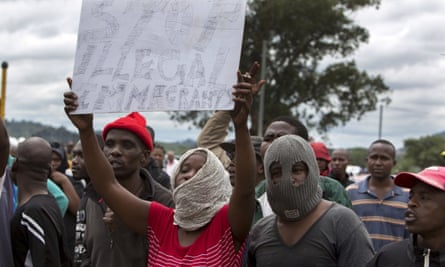South African police have used stun grenades, rubber bullets and water cannon to try to disperse anti-immigration protesters in the capital, Pretoria, and keep them from foreign nationals who had gathered to express alarm about recent attacks.
A police official said 136 people had been arrested in the past 24 hours.
Resentment against foreign nationals has sometimes turned deadly amid accusations that they take jobs from locals in a country where unemployment is more than 25%. Others are blamed for drug-dealing and other crimes.
In 2015, anti-immigrant riots in and around the city of Durban left at least six people dead. About 60 people were killed in similar violence seven years earlier.
On Friday protesters in Pretoria marched towards the foreign ministry, some carrying sticks or pipes. A petition was handed to the ministry in which they suggested the government teach immigrants to “speak properly”. The petition added: “They are arrogant and they don’t know how to talk to people, especially Nigerians,.”
The Nelson Mandela Foundation criticised authorities for “giving permission for a march of hatred”.
“We don’t have hate! We don’t have hate!” one foreign national was recorded as shouting in a video posted by local broadcaster eNCA.

A statement issued by President Jacob Zuma’s office said South Africans should not blame all crime on foreign nationals. It cited recent reports of violence in Pretoria and hate speech on social media.
“Many citizens of other countries living in South Africa are law abiding and contribute to the economy of the country positively,” Zuma said. “It is wrong to brandish all non-nationals as drug dealers or human traffickers.”
Amnesty International accused the authorities of failing to “address toxic populist rhetoric that blames and scapegoats refugees and migrants”.Zuma said South Africans were not xenophobic, and he called on everyone, citizens and non-citizens, to work together to combat the high crime rate.
The periodic backlash against foreign nationals has hurt the tolerant image the country has tried to present since the end of apartheid almost a quarter of a century ago.

Despite high unemployment, South Africa is one of Africa’s largest economies and remains a draw for people across the continent. Businesses run by Somalis, Ethiopians and others are often targeted in anti-foreigner protests.
Amid the anti-immigrant sentiment, government data shows the number of foreign-born people in South Africa has declined. A report (pdf) last year said the number of foreign-born people fell from 2.2 million in 2011 to 1.6m. South Africa has a population of more than 55 million.
Zuma’s statement on Friday acknowledged complaints about companies that hire what it described as “illegal immigrants”, saying the foreign office would crack down on all employers who “continue with this practice, which is dangerous as it pits locals against non-nationals”.
